Related Research Articles

Syndicalism is a revolutionary current within the labor movement that seeks to unionize workers according to industry and advance their demands through strikes with the eventual goal of gaining control over the means of production and the economy at large. Developed in French labor unions during the late 19th century, syndicalist movements were most predominant amongst the socialist movement during the interwar period which preceded the outbreak of World War II.
Anarcho-syndicalism is a political philosophy and anarchist school of thought that views revolutionary industrial unionism or syndicalism as a method for workers in capitalist society to gain control of an economy and thus control influence in broader society. The end goal of syndicalism is to abolish the wage system, regarding it as wage slavery. Anarcho-syndicalist theory generally focuses on the labour movement. Reflecting the anarchist philosophy from which it draws its primary inspiration, anarcho-syndicalism is centred on the idea that power corrupts and that any hierarchy that cannot be ethically justified must be dismantled.
The International Workers' Association – Asociación Internacional de los Trabajadores (IWA–AIT) is an international federation of anarcho-syndicalist labor unions and initiatives.
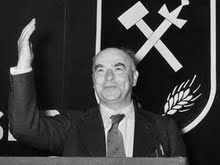
Otto Johann Maximilian Strasser was a German politician and an early member of the Nazi Party. Otto Strasser, together with his brother Gregor Strasser, was a leading member of the party's more radical wing, whose ideology became known as Strasserism, and broke from the party due to disputes with the dominant Hitlerite faction. He formed the Black Front, a group intended to split the Nazi Party and take it from the grasp of Hitler. During his exile and World War II, this group also functioned as a secret opposition group.

The Free Workers' Union of Germany was an anarcho-syndicalist trade union in Germany. It stemmed from the Free Association of German Trade Unions (FDVG) which combined with the Ruhr region's Freie Arbeiter Union on September 15, 1919.

Burgfriedenspolitik is a German term that refers to the political truce between Germany's political parties during World War I. The trade unions refrained from striking, the Social Democratic Party (SPD) voted for war credits in the Reichstag, and the parties agreed not to criticize the government and its handling of the war.

The Free Association of German Trade Unions was a trade union federation in Imperial and early Weimar Germany. It was founded in 1897 in Halle under the name Representatives' Centralization of Germany as the national umbrella organization of the localist current of the German labor movement. The localists rejected the centralization in the labor movement following the sunset of the Anti-Socialist Laws in 1890 and preferred grassroots democratic structures. The lack of a strike code soon led to conflict within the organization. Various ways of providing financial support for strikes were tested before a system of voluntary solidarity was agreed upon in 1903, the same year that the name Free Association of German Trade Unions was adopted.
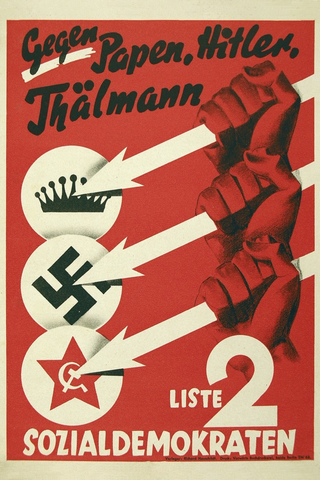
The Iron Front was a German paramilitary organization in the Weimar Republic which consisted of social democrats, trade unionists, and democratic socialists. Its main goal was to defend social liberalism and democracy and freedom against totalitarian ideologies on the far-right and far-left. The Iron Front chiefly opposed the Sturmabteilung (SA) wing of the Nazi Party and the Antifaschistische Aktion wing of the Communist Party of Germany. Formally independent, it was intimately associated with the Social Democratic Party of Germany (SPD). The Three Arrows, originally designed for the Iron Front, became a well-known social democratic symbol representing resistance against monarchism, Nazism, and Marxism-Leninism during the parliamentary elections in November 1932. The Three Arrows were later adopted by the SPD itself.

Die Einigkeit was a German newspaper, which appeared from 19 June 1897 to 8 August 1914. It was the organ of the radical socialist Free Association of German Trade Unions (FVdG). Its original editor was Gustav Kessler, but he was replaced by Fritz Kater after his death in 1904.
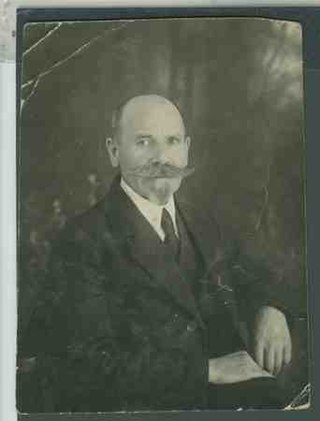
Fritz Kater was a German trade unionist active in the Free Association of German Trade Unions (FVdG) and its successor organization, the Free Workers' Union of Germany. He was the editor of the FVdG's organ Einigkeit and—after World War I—owner of the publishing houses Fritz Kater Verlag and Syndikalist.
Fritz Köster was a German anarchist editor and trade unionist.
Karl Roche (1862–1931) was a German syndicalist and left communist trade unionist. Roche joined the Free Association of German Trade Unions (FVdG) around 1900 as a seaman. He became a prominent member of the organization.

Milly Witkop(-Rocker) was a Ukrainian-born Jewish anarcho-syndicalist, feminist writer and activist. She was the common-law wife of the prominent anarcho-syndicalist leader Rudolf Rocker. The couple's son, Fermin Rocker, was an artist.

The First International Syndicalist Congress was a meeting of European and Latin American syndicalist organizations at Holborn Town Hall in London from September 27 to October 2, 1913. Upon a proposal by the Dutch National Labor Secretariat (NAS) and the British Industrial Syndicalist Education League (ISEL), most European syndicalist groups, both trade unions and advocacy groups, agreed to congregate at a meeting in London. The only exception was the biggest syndicalist organization worldwide, the French General Confederation of Labor (CGT). Nevertheless, the congress was held with organizations from twelve countries participating. It was marked by heated debate and constant disagreements over both tactics and principles. Yet, it succeeded in creating the International Syndicalist Information Bureau as a vehicle of exchange and solidarity between the various organizations and the Bulletin international du mouvement syndicaliste as a means of communication. It would be viewed as a success by almost all who participated.
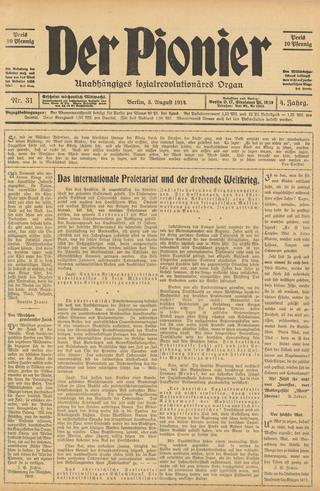
Der Pionier was one of two official organs of the radical socialist Free Association of German Trade Unions (FVdG).
The Social Democratic Party of the Free City of Danzig was a political party in the Free City of Danzig. After the creation of the Free City of Danzig in 1919, the Danzig branch of the Social Democratic Party of Germany (SPD) separated itself from the party, and created the Social Democratic Party of the Free City of Danzig. The new party did however maintain close links with the SPD, and its political orientation was largely the same as that of the SPD.
Raphael Friedeberg was a German physician, socialist and anarchist.
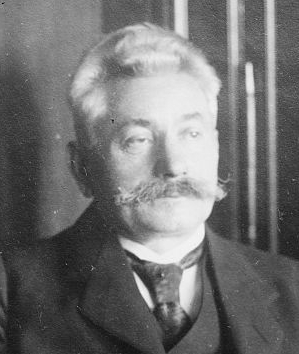
Carl Legien was a German unionist, moderate Social Democratic politician and first President of the International Federation of Trade Unions.
German individualist philosopher Max Stirner became an important early influence in anarchism. Afterwards Johann Most became an important anarchist propagandist in both Germany and in the United States. In the late 19th century and early 20th century there appeared individualist anarchists influenced by Stirner such as John Henry Mackay, Adolf Brand and Anselm Ruest and Mynona.
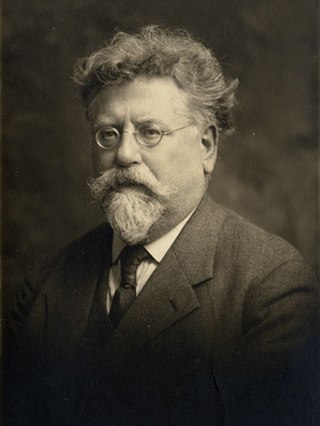
Johann Rudolf Rocker was a German anarchist writer and activist. He was born in Mainz to a Roman Catholic artisan family.
References
- ↑ "Windhoff, Carl (1872-1941) | libcom.org". libcom.org. Retrieved 31 July 2023.
- Bock, Hans-Manfred (1993) [First published 1967]. Syndikalismus und Linkskommunismus von 1918 bis 1923: Ein Beitrag zur Sozial- und Ideengeschichte der frühen Weimarer Republik (in German). Darmstadt: Wissenschaftlich Buchgesellschaft. p. 103. ISBN 3-534-12005-1.
- Rübner, Hartmut (1994). Freiheit und Brot: Die Freie Arbeiter-Union Deutschlands: Eine Studie zur Geschichte des Anarchosyndikalismus (in German). Berlin/Cologne: Libertad Verlag. p. 40. ISBN 3-922226-21-3.